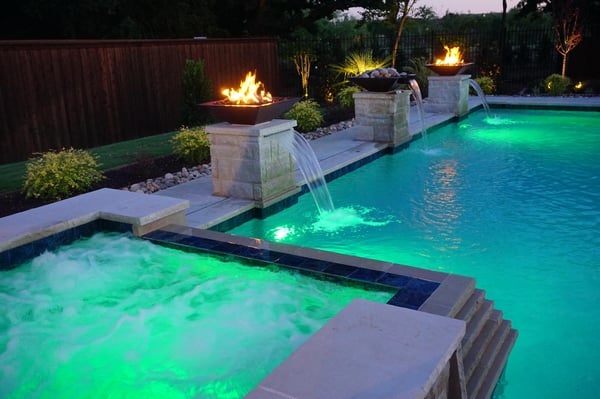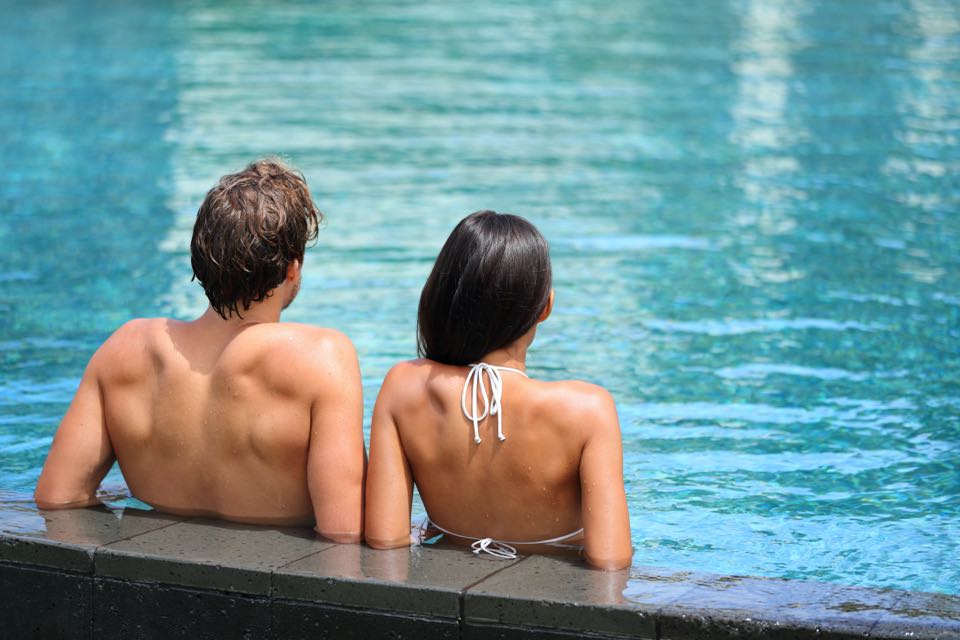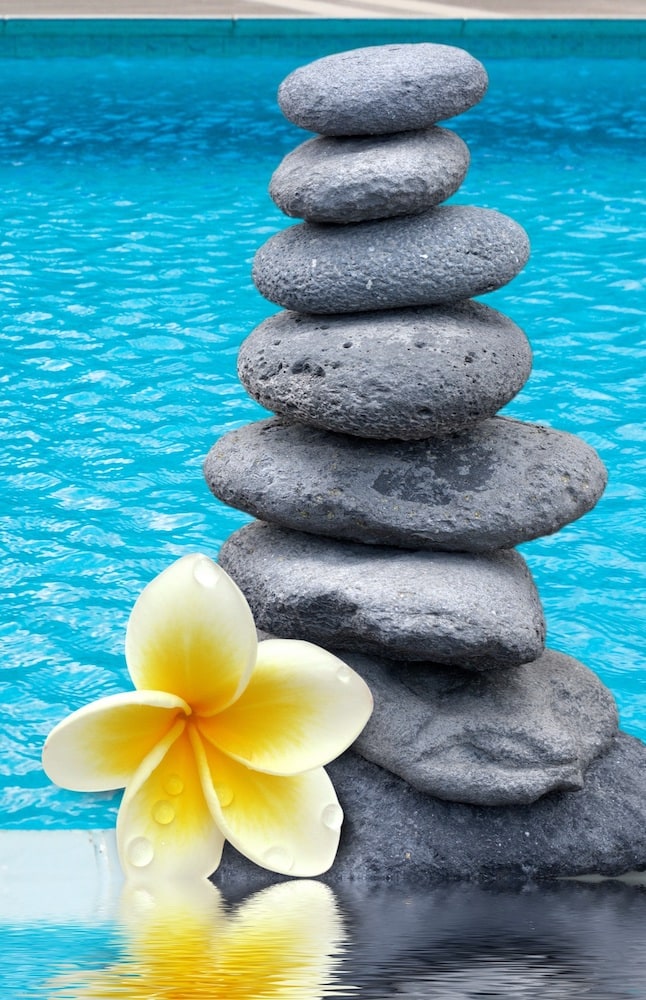When it comes to custom pool design, your Selah Design Consultant will explain all the factors to consider, from how much space you have to how you intend to use the pool. You have a selection of shapes and materials, each presenting a benefit to a particular yard size or type and how you want to enjoy your new lifestyle.
In this post, we’ll share with you some of the different types of pools, familiar shapes, their benefits, and the materials some pool contractors use to create your custom pool. Also, the decision to install a pool includes more than the pool itself. You have options including & considerations for landscaping, features, equipment, materials & color choices.
Determining Your Pool Design
Pools come in many different shapes and sizes. So do yards. Which ones go together best? Don’t worry, this is where you and your Design Consultant come together and where examples of Selah builds will guide you.
When you look at your yard, remember to consider space for more than the pool. We’ll help you consider items surrounding the pool and any additions you’ll want to make to enjoy the pool.
As you think about the space you have, consider how you want to use the pool. Do you want to use it for exercise or for family time, or both? Is the pool to be part of a visual theme? Who will use the pool most often — adults, adolescents, or children?
Structural strength requirements come into play according to the pool shape, construction material, soil, and how terrain & drainage works in your space. A pool that would work fine somewhere with rocky soil will require different structural specifications where the soil is mostly expansive clay.
So, how do you want to use your pool, what look are you going for, and how do soil and topography impact the selection of shape and material?
Type of Pools
The two choices an average homeowner considers are in-ground and above-ground.
Compared to a similar in-ground pool, an above-ground pool costs less upfront. Most above-ground pools can be installed quickly and for less money. An above-ground pool may be the better choice if you don't expect your pool to last for one or two seasons. Above-ground pools are less rugged and don't last as long as in-ground pools.
Most pool contractors don't install above-ground pools, and people often choose to install one themselves from a kit. Also, some HOAs disallow above-ground pools.
An in-ground pool can last a lifetime and longer when properly maintained. Inground pool builds are a time-honored solution that people who intend to enjoy their outdoor lifestyle for years to come.
Aesthetically, in-ground pools are always a more attractive centerpiece, forming the scene of beautiful landscaping, with inviting ambiance. Most modern home buyers value a well-designed swimming pool landscape and a well-positioned and maintained in-ground pool adds to the appeal of space.
Pool Shape or Style
In-ground pools can be built in almost any shape you can imagine. Much of your decision is then fully within your personal preference, although some choices depend on how you intend to use the pool and the shape and size of your yard.
Some people prefer a modern rectangular shape, while others like the flowing classic look of curved pool walls. Certain shapes support specific features better than others. It all depends on the overall design, not just for the pool but also for the area where the pool rests.
Freeform
A freeform pool is the most space-friendly because it is constructed to fit the space exactly. You can customize it any way you like, and a freeform pool typically has more curves than other pool shapes.
Kidney-Shaped
The kidney-shaped pool is a classic shape that supports added water features, such as waterfalls and grottos. The kidney-shaped pool is round on both ends and with an indent on one side, making it look like a kidney bean.
Figure 8
Similar to a kidney shape, the figure 8 is rounded on both ends and tapers into the middle. It also provides space for features like grottos. It allows the free flow of water, allowing it to circulate throughout the pool instead of bounce back from the sides like a rectangular pool.
Rectangle
One of the most common and classic shapes, a rectangle is most often used where space is at a premium, or your intent includes “swimming laps”.
L-Shaped
The L-shaped pool includes a vertical shank that is shorter and less wide than the other leg. The longer, wider part provides space for swimming while the shorter end can be used as a spa or other feature. This shape is great to work with your existing courtyard with unique requirements.
Oval
An oval works well as a large oasis and in large yards. Natural landscaping, such as palm trees and small hedges, looks especially beautiful around an oval pool.
Circular
If you have a vast space or prefer an indoor pool, a circular shape is a way to go. Circles are also common for children's pools. Our favorite example includes a “dry landing” interior to the circle for seating and a fire pit “island” feature.
Geometric
A geometric shape can be designed to fit your particular yard while providing corners and edges for a more structured look. Your pool can look like a “sports court” for water volleyball or basketball. Geometric shapes accommodate steps into the pool, and you can have more people in the water at a time.
Roman
As a large rectangular pool with rounded corners emerging from both ends, the Roman pool is excellent for sunbathing and has an upscale appeal.
Materials
You can construct your pool using fiberglass, Gunite™ concrete. Some pools are made of vinyl liners, but they are not as robust and limited to “cookie-cutter” designs.
Fiberglass pools are constructed in a factory. The manufacturer uses a mold to shape the fiberglass, and the result is shipped to your home and installed into the excavated hole. Fiberglass pools have smooth surfaces and can be slippery and are not at all forgiving of temperature changes or shifting soils.
Concrete is a commonly used material in custom pools, and it can accommodate nearly any shape and last for decades.
Gunite is a rebar framework sprayed with a mixture of concrete and sand. Like concrete pools, the installation is entirely onsite and is preferred over traditionally poured concrete which requires a wooden framework.
Gunite is exceptionally durable and can be shaped into any design. With a finer “dry mix” including Portland Cement, Gunite prevents cold welds that can form cracks in a pool shell, over time.
Wrapping It Up
How long do you expect to enjoy your pool? Most who make the investment hope to use their pool for many years to come. An in-ground pool can provide fun in and around the water for decades while adding to the appeal of your yard.
Selah builds almost exclusively with Gunite cement for our builds. Ask your Design Consultant about our limited lifetime warranty of your pool shell. A Selah Pool should add to the value of your home because we build for enduring beauty.
When selecting the shape of your pool, consider the shape of the space, how you intend to use the pool, and what you might like to place around it as you finalize your design. Include in your choice your preference for a patio, outdoor kitchen, pergola, or walkway since all are designed to enhance your pool experience.
The shape also drives your plant selections and landscape design. All of it should come together into a single oasis for year-round enjoyment.






